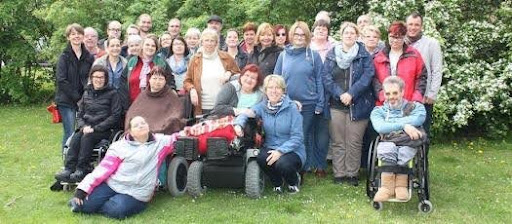- Summary
- Fact Sheet
- Synergy and Transfer
- More Information
The project aims to promote the inclusion and active participation of people with disabilities in decision-making processes within social service institutions. The project focuses on the creation of sustainable concepts for the recognition, perception and representation of the interests of people with disabilities and mental illnesses within the institutions of Diakonie Mitteldeutschland. The project draws on best practice from its partner, the Centre for Competences in Vienna, and includes activities such as work placements, exchanges and discussions aimed at developing participants’ self-confidence and independence. The programme is designed to comply with the UN Convention on the Rights of Persons with Disabilities.
Target Groups:
The project targets executives who manage services and institutions that work with people with disabilities (e.g. hostels, workshops). A key target group is people with disabilities who are active multipliers in their environment, such as residents’ councils and workshop councils. The project involves 15 people with disabilities (and their assistants), 11 staff members from the social services department of Diakonie Mitteldeutschland.
Special support required:
Special support for participants with disabilities includes ensuring that the mobility experience is accessible and inclusive. Activities are designed with short sequences and sufficient breaks to meet the needs of all participants. The inclusion of assistants ensures that participants with disabilities can fully participate and act as multipliers. The project promotes independence and self-confidence, ensuring that people with disabilities can contribute meaningfully to decision-making and inclusion processes within their institutions.
Innovation:
A key innovation in this project is the active involvement of people with disabilities in political and institutional change processes. Participants with disabilities act as multipliers, sharing their experiences and pushing for further inclusion within their institutions. The project integrates intercultural exchange and peer learning through cooperation with the Vienna-based partner, enabling participants to learn from best practice examples abroad.
The mobility aspect, which includes internships and exchanges with professionals and people with disabilities from Austria, offers significant opportunities for transfer to other institutions in Germany and beyond. The project promotes practical learning that can be adapted and scaled to other social service institutions. The project is also in line with the objectives of the UN Convention on the Rights of Persons with Disabilities and offers a transferable model for improving inclusion and representation across borders.
Project Website:
https://erasmus-plus.ec.europa.eu/projects/search/details/2016-1-DE02-KA104-003219
Diakonisches Werk Evangelischer Kirchen in Mitteldeutschland e. V.

